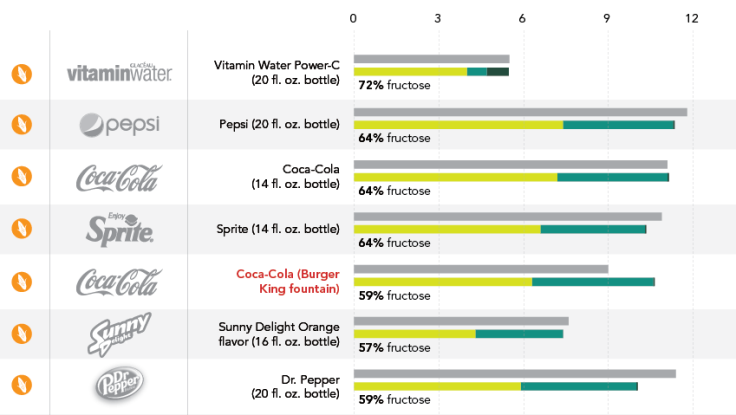What Soda Companies Really Mean By 'Sugar': You Might Be Consuming More Fructose Than You Thought

What you thought was simply “sugar” might actually be highly concentrated amounts of fructose in your favorite sodas, according to a study led by researchers at the Childhood Obesity Research Center (CORC) at the Keck School of Medicine (University of Southern California).
The authors examined the chemical composition of 34 different beverages. They found that those made with high fructose corn syrup (HFCS) — including Coca-Cola, Pepsi, Dr. Pepper, and Mountain Dew — all contained 50 percent more fructose than glucose. Most soda companies claim that their drinks contain no more than 55 percent fructose, but the study called into question the validity of those claims: most drinks contain an unhealthy concoction of highly-concentrated fructose and glucose.
Glucose and fructose are each metabolized differently in the body. While both are simple sugars, glucose is really the one keeping your body energized: also known as blood sugar, it maintains your metabolism. Fructose, while found in many fruits and vegetables, is harder to break down because it can only be metabolized in the liver; it's also far more fat-producing than glucose and is associated with diabetes and obesity. When you consume large amounts of fructose, it can be damaging to your health.
This is why it’s frightening to think that many soda companies actually put higher amounts of fructose in their drinks than they state on their labels, as seen in the infographic below.
“We found what ends up being consumed in these beverages is neither natural sugar nor [high fructose corn syrup], but instead a fructose-intense concoction that could increase one’s risk for diabetes, cardiovascular disease, and liver disease,” Michael Goran, director at the Childhood Obesity Research Center and leading author of the study, said in the press release. “The human body isn’t designed to process this form of sugar at such high levels. Unlike glucose, which serves as fuel for the body, fructose is processed almost entirely in the liver where it is converted to fat.”
Source: Walker R, Dumke K, Goran M. “Fructose content in popular beverages made with and without high-fructose corn syrup.” Nutrition, 2014.



























